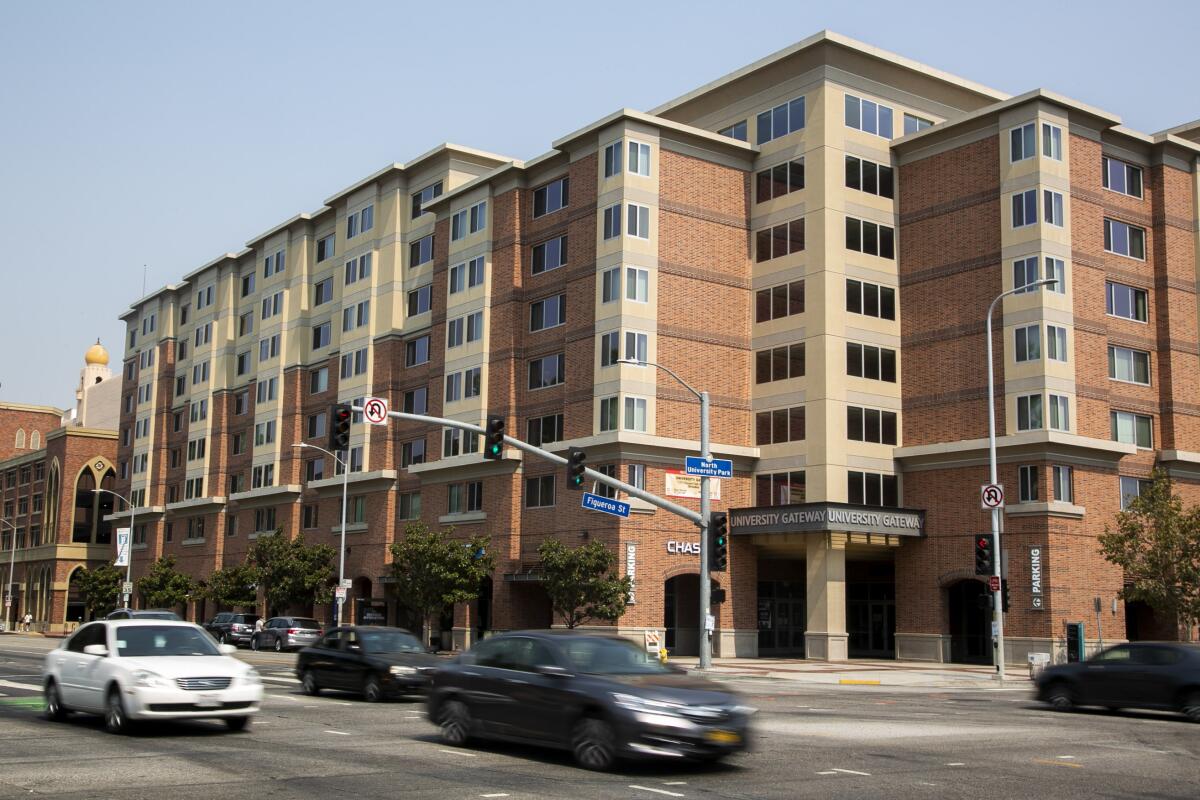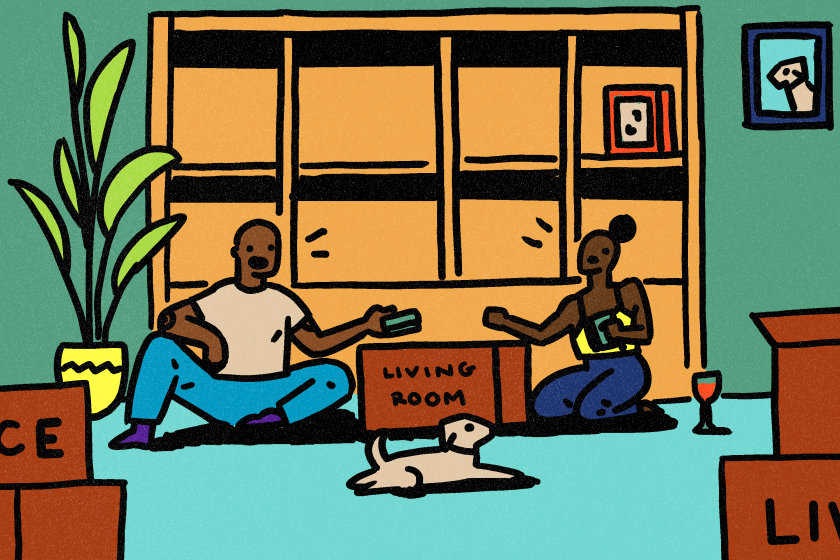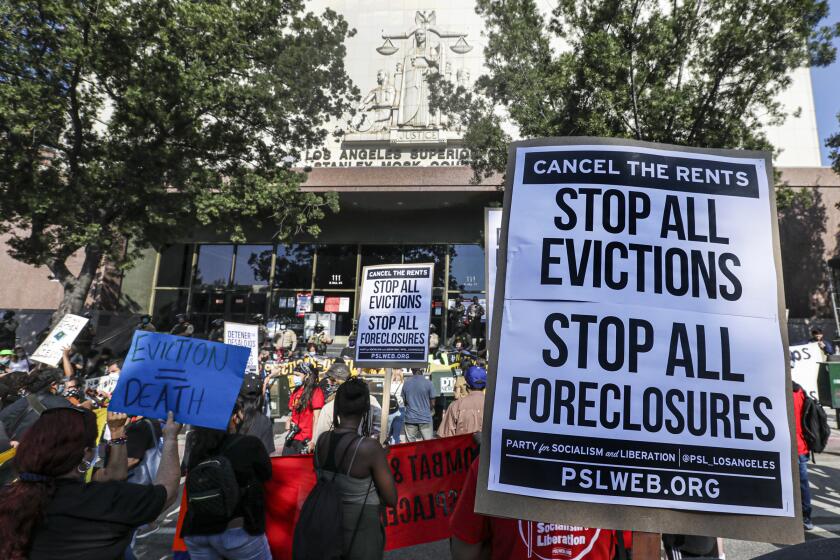Renegotiating rent can be tricky. Here’s what to keep in mind, and what to do if you can’t pay

Due to the COVID-19 pandemic, Lee Anne Lowery-Gorman had to permanently close her restaurant. In addition to being a struggling business owner, she is the landlord of a duplex in Hollywood. So when she learned that both her renters’ jobs were in limbo, she understood.
In July, she gave them a rent break that will last through the new year. It was the lowest she could go while still making her mortgage payments.
“Our business landlord would not work with us at all on our rent, so we know how hopeless and futile that felt for us,” said Lowery-Gorman. “We didn’t want our tenants to feel that way and be afraid they would lose their homes.”
But not all landlords are willing — or able — to reduce their tenants’ rent.
The Los Angeles Times has asked readers whether they were unable to pay their rent because of the coronavirus and whether they had tried to renegotiate their rent in Southern California. Many respondents who had tried renegotiating said they were rejected.
When it comes to negotiating rent, it helps to educate yourself about the housing market and consider asking for a temporary reduction or concession. But in many cases, you’re at the mercy of your landlord.
“A lot of it depends on all these individual nuances of where they live,” said Larry Gross, executive director of the Coalition for Economic Survival. “But it varies. There isn’t a silver bullet. It’s a lot more complex.”
Here’s what you should know if you want to try to renegotiate with your landlord, other concessions you can ask for and what to do if you can’t pay your rent.
The best time to negotiate
Negotiating your rent is easier if your lease is almost up and you’re looking to sign a new one, because you’ve honored your previous agreement and have more leverage. But you can try negotiating at any time.
The best time of year is late fall and winter, when fewer people are looking for housing and prices are less competitive.
Data from the apartment and home rental site HotPads show that June is the most expensive month to rent in Los Angeles. November is the least expensive, and it’s also the best time to sign a new lease.
In major cities such as Los Angeles, rent is falling during the COVID-19 pandemic. But in suburban markets such as the Inland Empire, rent is rising fast.
Compare your rent with similar properties nearby
One renegotiation strategy is to show that you can easily get a better deal a few blocks over. Look at apartment listing websites to find the going rate in your area and whether it’s dropping.
“Landlords should be prepared for negotiations, quite frankly, because there is so much data out there,” said Joshua Clark, an economist at Zillow. “There are a lot of ways to look at the housing market, and consumers are getting more and more savvy.”
Clark recommends reviewing each listing in your area to understand the competition. Does it come with a washer-dryer, ample closet space or other amenities?
“The best apples-to-apples comparison is dollars per square foot,” said Steve Basham, a managing analyst at CoStar Group, which owns apartments.com.
Usually, high-end neighborhoods such as downtown L.A. and Santa Monica charge more per square foot. But during the pandemic, when businesses are closed and people are working at home, landlords are trimming prices.
In contrast, as many move east to the Inland Empire out of necessity or a desire to save, some rents in more affordable areas are either flattening out or rising.
Andy Lin, managing director of A&J Property Management, said the market in the San Gabriel Valley has held up fairly well during the pandemic, and he’s had to renegotiate only a few leases, compared with property managers in other areas.
“Be reasonable,” he advised. “If the tenant has financial hardships and wants to reduce their rent during this time, it is possible to ask the landlord for a discount. ... Some tenants want us to waive the rent for a few months. I have not come across one landlord who has agreed to that.”Understand your landlord’s situation
“Not all landlords are rolling in money,” said Kimberly Lewis, who rents her Lancaster townhouse to tenants who use Section 8 vouchers. “But let me tell you something: I’d rather have someone in [the unit] than have it be empty.”
Lewis is the founder of the I Did Something Good Today Foundation, which works with seniors in need, and she has experience negotiating with landlords on behalf of her clients.
“It’s best if both sides try to understand,” she said.
Is your landlord someone who works a 9-to-5 job and manages a small property? Or do you live in a building owned by a large corporation?
Basham said most professionally managed properties have folks who keep a close eye on their competition.
But “if your place is managed by an individual instead of a property manager, that might be someone who isn’t keeping up with the pulse of the market,” he said. “So you might be in an area where rents are a little below market value because the property isn’t being managed quite as aggressively.”
That said, the mom-and-pop landlords may have less room to budge if they are depending on your rental income to cover monthly mortgage payments. Others with government-backed mortgages may have already applied for a forbearance program, which allows their payments to be deferred for up to a year.
So it depends on your situation.
Lowery-Gorman suggests that tenants have open, honest communication with their landlords often.
“Most people find it difficult to talk about money, or lack thereof, but just bite the bullet and ask for help,” she said.What else can you ask for if a rent reduction isn’t an option?
Concessions: Zillow shows that in October 2020, 37% of rental listings in Los Angeles and Orange counties were offering at least one concession, or promotion, to attract renters to vacant units. This was more than twice as many as at the same time last year.
In L.A., 93.5% of the concessions included weeks or months of free rent. Others offered discounts on the deposit, free parking or gift cards. The effective savings over the life of a lease was 11.5%.
Look to see if this is happening in your area.
Clark explains that a landlord is more likely to agree to a concession, which is temporary, than to a lower rent. This is so that when the market normalizes, their monthly income hasn’t changed.
Payment plans: Other respondents to the L.A. Times questionnaires reported working out payment plans with landlords, perhaps delaying when rents were due or agreeing to pay back rent in small increments over a longer period of time.
Keep in mind that if you have lost your job or been hurt financially because of the pandemic, you don’t have to negotiate a payment plan right now. There are national, state and local eviction protections that already allow you to pay your rent at a later date.
The national eviction moratorium orders a temporary halt in residential evictions through the end of the year. In September, Gov. Gavin Newsom signed a bill that protects renters in California from being evicted through Jan. 31, 2021, as long as they pay at least 25% of their rent and file a declaration with their landlord attesting that they are suffering financial hardship because of pandemic-related business shutdowns. That quarter of rent isn’t required every month; it could come in a lump sum, as long as it’s paid by Jan. 31.
Javier Beltran, deputy director of the Housing Rights Center, recommends NoRent.org, which provides a template letter written by lawyers and tenants’ rights organizations. The organization will send an email, as well as a letter by certified mail, to your landlord for free.
But whenever protections end and it comes time to negotiate payment plans again, Beltran said, it’s important to make sure it’s something you can afford.
“Don’t play with the ideal of ‘Maybe I can get a higher-paying job, and that’s going to solve the problem,’” he said. “Otherwise, you’ll put yourself in a situation where the landlord is not going to be happy because you broke your ‘promise.’”
Extending your lease: Sometimes landlords are willing to negotiate less rent per month in exchange for a longer lease, so they don’t have to worry about having a vacant apartment.
Clark explained that extending your lease a few months to the summer — when the landlord might be able to charge more for a new lease during the more competitive season — in exchange for less rent per month could be a beneficial option for both parties.
Breaking your lease: If moving out is an option, you may be able to negotiate ending your lease early.
An eviction notice isn’t the end of the line. Especially during the COVID-19 pandemic, there are many ways to fight it.
What if you still can’t afford the rent?
Beltran said the reality is that many landlords won’t budge.
For many of his clients, when they have negotiations with their landlords, it’s not the renters negotiating to lower their rent; it’s landlords negotiating to raise it.
DeWayne Gatewood lost one of his two jobs when bars closed during the pandemic. Though he has been living in his Hawthorne apartment for a decade, he said, his landlord was not sympathetic to his situation. In fact, his rent increased in April.
He’s currently paying the 25% of rent that protects him from eviction, but he doesn’t know what he will do if business doesn’t pick up soon or if there isn’t a second coronavirus relief check.
For those who are living in high-end or mid-price markets, there’s the option of moving somewhere nearby that’s more affordable. But for some renters, they’d have to uproot their lives. So for the Housing Rights Center, the priority is always to see if there’s a way to help tenants stay in their homes, Beltran said.
Affordable housing, such as Section 8 and public housing, is available, but it often requires navigating applications and government agencies. Here’s what you need to know.
Here are some actions to take if you can’t afford the rent:
Reach out to local housing rights centers and tenants’ rights attorneys: The Coalition for Economic Survival offers free tenants’ rights clinics on Saturdays; you can register to meet online one-on-one with volunteer attorneys.
“They’ll go into [Zoom] breakout rooms with attorneys who will go over their case, advise them what their rights are, what their options are and what steps they need to take to protect themselves and keep the roof over their heads,” Gross said.
Save what you can: If it’s a choice between getting further in debt or paying for groceries, pay for your groceries, said Beltran. But set aside whatever you can afford each month to save for the day eviction moratoriums end.
“Our biggest fear, as defense attorneys and tenants’ rights groups, is the tsunami, or tidal wave, of evictions that we’ve been anticipating if none of the further protections are kicked in by Feb. 1,” he said. “It could be a dire situation, because my guess is that most are living paycheck to paycheck, maybe even unemployment check to unemployment check, and there isn’t going to be a significant improvement [in the economy] by February.”
Contact your representatives: Contact your city council members, county supervisors, state Assembly members and state senators to let them know your situation.
“We know that this has an effect, because when tenants reach out to their representatives, then they reach out to us, the nonprofit groups doing the work, and ask, ‘How can we solve the problem?’” Beltran said. “The more voices they hear collectively, the better it’ll be for that policy change.”
Homelessness prevention funds: Depending on your circumstances, it may be worth it to look into homelessness prevention funding.
“Usually the situation is that someone has a new job but are a month or two behind rent, and they can apply for rental assistance through social services to catch up and make sure they maintain their payments working forward,” Beltran said.
There are city and county agencies, in addition to homeless service providers, but they all work differently, so it will take some research to figure out if agencies in your service planning area are accepting applications and if they still have funds.
“Be prepared to do some legwork, but if you can find something, absolutely apply,” he said. “Any rental assistance you can get is going to be helpful, so you can use other money for other expenses, like medical, food or other bills.”
Educate yourself on tenants’ rights: Gross said one of his organization’s mantras is: Don’t sign anything from your landlord before educating yourself.
“Most tenants have more protections than they think and don’t know their rights,” Gross said. “People think that if they don’t pay their rent tomorrow, they can get thrown out the next day, and that’s not true.”
Beltran points to stayhousedla.org, which offers numerous tenant education workshops.
If you’re like most people in Southern California, you live in a rental.
More to Read
Sign up for Essential California
The most important California stories and recommendations in your inbox every morning.
You may occasionally receive promotional content from the Los Angeles Times.














